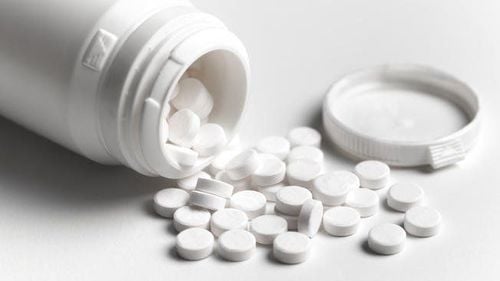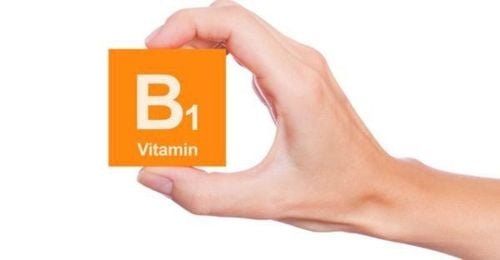This is an automatically translated article.
The article is professionally consulted by Master, Doctor Nguyen Thi Ngoc - General Internal Medicine - Endocrinology - Department of Examination & Internal Medicine - Vinmec Central Park International General Hospital. Doctor has more than 10 years of studying, researching and working in the field of endocrinology.Thiamin (vitamin B1) helps the body make energy from nutrients. Thiamine is essential for the growth, development and function of cells.
Most people get enough thiamin from the foods they eat every day. Foods rich in thiamin include yeast, legumes, pork, and brown rice, as well as fortified foods, such as breakfast cereals. However, heating foods containing thiamin can reduce thiamin content. Thiamine can also be taken as a supplement.
1. What is Thiamine?
Thiamine is an essential nutrient that all the body's tissues need to function properly. Thiamin was the first B vitamin that scientists discovered. This is why its name carries the number 1. Like other B vitamins, thiamin is water-soluble and helps the body turn food into energy. You can find it in foods and multivitamins.The body needs thiamine to make adenosine triphosphate (ATP). This is a molecule that transports energy in cells. A thiamine deficiency can affect many different functions of your body, including those of the nervous system, heart, and brain.
Currently, thiamine deficiency is rare. Thiamine deficiency is rare in otherwise healthy adults. Thiamine deficiency often occurs in people with weakened immune systems. Factors that decrease thiamine levels include: alcoholism, Crohn's disease, anorexia. People who are on dialysis or taking diuretics are also at risk for thiamine deficiency. Diuretics, prescribed for people with congestive heart failure, can cause thiamine to leave the body. The functioning of the heart relies on thiamine to function properly. People taking digoxin and phenytoin should also be careful about their effects.
Thiamine deficiency can lead to two main health problems: beriberi and Wernicke-Korsakoff syndrome. Beriberi affects breathing, eye movements, and heart function. It's caused by a build-up of pyruvic acid in the blood, which is a side effect that prevents your body from turning food into energy.
Wernicke-Korsakoff syndrome are technically two different disorders. Wernicke's disease affects the nervous system and causes impaired vision, lack of muscle coordination, and mental impairment. If Wernicke's disease is left untreated, it can lead to Korsakoff syndrome. Korsakoff syndrome permanently impairs memory functions in the brain. Either disease can be treated with thiamine injections or supplements. This can help with vision and muscle problems. However, thiamin cannot fix the permanent memory damage caused by Korsakoff syndrome.

Người đang sử dụng thuốc lợi tiểu có nguy cơ thiếu Thiamin
2. Uses of Thiamin
Thiamin (vitamin B1) is used to prevent or treat low levels of vitamin B1 in people who do not get enough vitamin from their diets. Most people who eat a normal diet do not need extra vitamin B1. However, certain conditions (such as alcoholism, cirrhosis of the liver, stomach and intestinal problems) can cause low vitamin B1 levels. Vitamin B1 plays an important role in the body. It is necessary to maintain the health of the nerves and heart. Low levels of vitamin B1 can cause heart failure and mental and neurological problems. In addition, thiamin combined with certain other vitamin supplements may reduce the likelihood of developing cataracts.3. How to use Thiamin
Take vitamin thiamin 1 to 3 times per day. Follow all directions on the product package, or as directed by your doctor. If you are unsure of any information, consult your doctor or pharmacist before taking.Dosage is based on your medical condition and the vitamin's response to treatment. Use thiamin regularly to get the most benefit from it. To help you remember to use it every day, you should take it at the same time each day.
Tell your doctor if your condition persists or gets worse. If you think the condition is serious, you should seek medical attention immediately.
4. Side effects when using thiamine

Tthường xuyên ăn cá sống hoặc động vật có vỏ có thể góp phần vào việc thiếu thiamin
When used as an oral supplement in appropriate doses, thiamin rarely causes skin reactions. There is currently no evidence that thiamin interacts with other medications. However, regularly chewing areca nut (betel nut) or regularly eating raw fish or shellfish can contribute to thiamin deficiency.
To understand more about supplementing with essential vitamins and minerals for the body, you can refer to the website of Vinmec International General Hospital for more useful information shared from doctors and experts. nutrition.
Please dial HOTLINE for more information or register for an appointment HERE. Download MyVinmec app to make appointments faster and to manage your bookings easily.
References: Mayoclinic.org; Webmd.com












